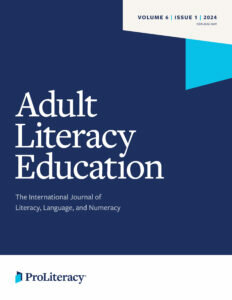Because the Workforce Innovation and Opportunities Act (WIOA) prioritizes funding adult education programs that lead adults to career pathways, only 2% of our lowest-level adults in need of basic education are now receiving services. A Forum titled “The Power of Partnerships” in our new issue of Adult Literacy Education: The International Journal of Literacy, Language, and Numeracy, addresses this gap with leading experts sharing their experiences of how they reached low-level adults who have been left on the fringes as the field shifted to career-focused instruction and funding.
 Contributors from Philadelphia, Houston, and Portland, Ore., discuss building atypical learning environments by partnering with other social service providers to meet and educate adults where they are to successfully create a community-based collective approach to literacy.
Contributors from Philadelphia, Houston, and Portland, Ore., discuss building atypical learning environments by partnering with other social service providers to meet and educate adults where they are to successfully create a community-based collective approach to literacy.
“These cities are not the only three cities where programs have faced the issue of how to reach low-level adults. However, by sharing their experiences and lessons learned, it creates a launching pad for others to think about how they could use a similar model in their own communities to create sustainable access to adult literacy services at the most basic levels,” said Mark Vineis, ProLiteracy president and CEO.
We are dedicated to giving adult literacy practitioners, researchers, funders, and policymakers evidence-based information about the field to guide their practice through the journal. We also want to prompt important discussions and build sustainability within the field.
We partner with Rutgers University to produce Adult Literacy Education. The journal editors—Alisa Belzer, Amy Rose, and Heather Brown—are leading researchers in the field of adult literacy and education who believe research is an important complement to practitioners’ experiences, intuition, and professional training.
A new issue of the free online journal is released three times per year to share the latest research and best practices in adult literacy, numeracy, and English language education. Each article in Adult Literacy Education goes through a blind peer-review process to ensure we are publishing the highest quality information that the field can trust and use.
Writers interested in submitting articles for consideration in future issues of the journal can find author guidelines and a submission form on the journal’s webpage.
By keeping our research free, we can ensure that the important information shared in the journal can benefit all adult learners equally.